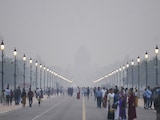Iranian authorities have prevented jailed Iranian Nobel peace laureate Narges Mohammadi from attending the burial ceremony of her father who died earlier this week, her family said Thursday.
Karim Mohammadi, who had not seen his daughter for almost two years, died on Tuesday aged 90. He was buried earlier Thursday in the city of Zanjan northwest of Tehran.
"Heartbreakingly, Narges Mohammadi was denied the opportunity to attend the ceremony and bid her final farewell to her father," her family said in a statement.
The family had previously said it was Mohammadi's "unequivocal right" to attend her father's funeral.
Mohammadi, 51, was last year awarded the Nobel Peace Prize in recognition of her campaign for human rights in Iran which has seen her spend much of the last two decades in and out of jail.
She now been incarcerated since November 2021 and has not seen her Paris-based husband and twin children for several years. Last year, she was also deprived of the right to make telephone calls from prison even to relatives inside Iran and this has yet to be restored.
The family said the restrictions meant that she had not seen her father for 22 months and had not spoken to him by phone for the last three months. Even on the day he died "she wasn't allowed to make a call to offer condolences to her family."
The New York-based Center for Human Rights in Iran cited her father as saying a few days before he died: "The longing to hear my daughter's voice from the prison of the oppressor is unbearable."
Mohammadi has been hit with a string of extra convictions while behind bars, the latest an additional sentence of more than one year in prison on charges of spreading propaganda against the Islamic republic while in prison.
According to her family, her sentences now amount to 12 years and three months of imprisonment, 154 lashes, two years of exile, and various social and political restrictions.
But there has been no let-up in Mohammadi's campaigning despite her incarceration.
She has expressed dismay over the surge of executions in Iran while backing the protests that erupted from September 2022 after the death in custody of Mahsa Amini, 22, for allegedly violating Iran's strict female dress code.
A vehement opponent of the head covering required of women in the Islamic republic, Mohammadi has also defied rules about wearing the headscarf inside prison.
"The Iranian people have turned the page on this regime," she told France's Le Monde daily in an interview published on Thursday. "I think at the earliest opportunity people will return to the street."
Her comments came a day before Iran holds on Friday elections for parliament and the key Assembly of Experts.
(Except for the headline, this story has not been edited by NDTV staff and is published from a syndicated feed.)















